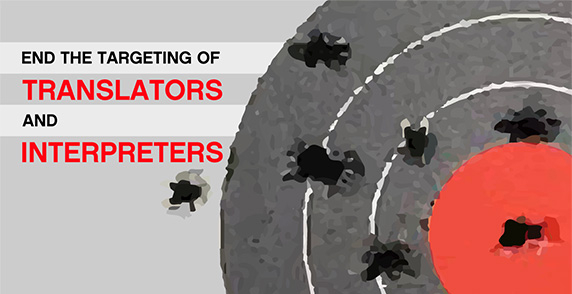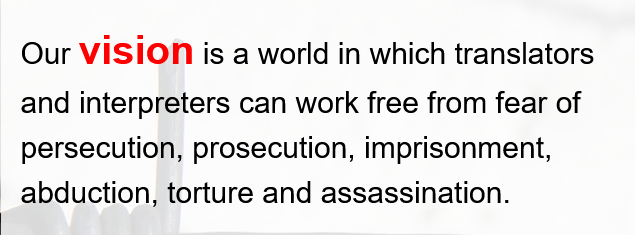La Linterna del Traductor has interviewed Dr. Maya Hess, the founder and CEO of Red T, a non-profit that advocates across the world for linguists in conflict situations. We asked her, among other things, about the latest activities of her organization and how its work has been impacted by the Covid-19 pandemic.
Red T was founded over 11 years ago. The organization was named honorary member of Asetrad in 2018, and while most colleagues know what you do, for those who don’t, perhaps you could describe your mission in as few words as possible.
Red T is a U.S.-based non-profit organization whose mission is the protection of translators and interpreters in high-risk settings worldwide.
And in keeping with that mission, what sort of action does the organization take?
We advocate across the world for laws and policies that mitigate the threats to linguists operating in high-risk settings.
We engage in a variety of initiatives (see red-t.org). For instance, we advocate across the world for laws and policies that mitigate the threats to linguists operating in high-risk settings. To raise awareness of our cause, I speak before governmental and intergovernmental bodies as well as at universities and conferences. We also furnish expert opinions in court cases involving T/Is and have supported individual T/Is in their struggle for justice or resettlement from conflict zones.
To strengthen our mission, we built strategic alliances with the world’s major translation and interpreting associations, initially partnering with the International Association of Conference Interpreters (AIIC) and the International Federation of Translators (FIT) to issue a Conflict Zone Guide for T/Is. This text offers the first-ever guidelines for civilian linguists and their employers in conflict situations. Its objective is to familiarize novice interpreters and their employers with their basic rights and responsibilities. The guide is available in 32 languages on the Red T website and has been distributed to key stakeholders, among them, interpreters, the military, NGOs, and journalists.
This example of unity in solidarity across countries and continents (…) increases our strength and ability to influence policy.
Our language coalition then quickly expanded to include the International Association of Professional Translators and Interpreters (IAPTI), Critical Link International (CLI), the World Association of Sign Language Interpreters (WASLI), as well as the Conférence international permanent d’instituts universitaires de traducteurs et interprètes (CIUTI). These organizations constitute the core members of another of Red T’s initiatives, i.e., the Open Letter project, in which we send letters to individual governments urging them to adopt protective policies for T/Is who worked for their armed forces or release wrongfully incarcerated linguists. The list of signatories to these letters has been growing steadily and includes Amnesty International and PEN International. Also, depending on the recipient of a given Open Letter, Red T may call on ad hoc signatories from the respective country or intergovernmental organization. This example of unity in solidarity across countries and continents, a historic first for the world language community, increases our strength and ability to influence policy. To read individual letters, please go to red-t.org/our-work/open-letters.
How do you measure the success of these awareness-raising campaigns? Could you cite a few success stories?
Let me give you four examples in which Red T played an instrumental role, but understand that it always takes a village to improve a policy or bring individual cases to a successful conclusion.
In terms of our participation in court cases involving T/Is, we were asked to write an expert opinion for an asylum appeal in the United Kingdom. The Home Office intended to repatriate an interpreter to Afghanistan, claiming that it was safe there despite significant evidence to the contrary. Not only was the appeal won and the interpreter allowed to remain in safety, but the UK government declared it would review its existing deportation policy.
With regard to the impact of Open Letters sent by our international language coalition, certain letters received a response while others did not, although not getting an answer does not necessarily suggest that the letter was unsuccessful (some countries have a policy of not responding to open letters). A positive example is the Australian government’s response to our coalition’s letter asking that they modify the visa application process for Iraqi interpreters. One of the requirements was that linguists apply in person at the Australian embassy in Amman, Jordan, which, of course, meant they had to travel through dangerous, war-torn territory. The Department of Home Affairs informed us that interpreters would now be permitted to submit applications by mail or courier. Another Open Letter that proved effective involved an intergovernmental organization, i.e., NATO. Several months prior to the final withdrawal from Afghanistan, we wrote to Secretary General Jens Stoltenberg and I received a personal response in which he met our coalition’s ask. In his letter, he stated that “I have encouraged Allies and partner countries to accept local employees, including interpreters, who are considered at specific risk due to their NATO employment.”
Red T writes letters to governments in which we advocate for individual interpreters.
Separately from the coalition, Red T writes letters to governments in which we advocate for individual interpreters. To do so, we connect directly with linguists hiding in their home countries or those who have become refugees. We respond to their queries and match them with resources as best we can. And to amplify their stories, we work closely with journalists. In this way, we hope to tap into the humanity of governmental bureaucracies, which may be an oxymoron but sometimes works. One relevant success story is that of James Akam, a former Afghan interpreter whose parents were murdered by the Taliban because he aided Canadian troops. He was forced to flee and ended up penniless in a refugee camp in southern Germany. From there he needed to travel to the Canadian Embassy in Berlin, some 300 kilometers away, for his visa interview. Working with a Toronto Sun journalist and exerting social media pressure on the Canadian Immigration Minister, we ultimately managed to get James first to Berlin and then to Canada, where he built a new life for himself and his family. And in this case, we also enlisted the crucial support of the German Federal Association of Interpreters and Translators (BDÜ), which took James under their wing until his takeoff to Canada.
In what areas of the world would you say Red T’s activities are most needed now?
(…) our efforts are geared toward obtaining a United Nations resolution or similar legal instrument to protect civilian T/Is in conflict situations.
While, for obvious reasons, our efforts have been concentrated on the Iraq and Afghanistan conflicts, these two hotspots have taught us that we must pursue a more international approach. In other words, at this juncture, we are not focusing on any particular country/region in our policy work. Instead, our efforts are geared toward obtaining a United Nations resolution or similar legal instrument to protect civilian T/Is in conflict situations (see, for instance, the proposed draft posted on our website).
Red T is also a member of the new NGO Committee on Language and Languages that is being formed under the auspices of CoNGO (Conference of Non-Governmental Organizations in Consultative Relationship with the United Nations) and will advance our cause in the context of UN language policy.
Has the Covid-19 pandemic had an impact on the lives of T/Is around the world and on your activities? Please explain.
The pandemic has further slowed the visa application process for T/Is who assisted coalition forces in Afghanistan and Iraq.
I am going to confine my remarks to T/Is in areas of conflict and yes, they have been particularly impacted. From a health perspective, there is the general lack of medical resources in war zones. And then you have Covid-19’s effect on the bureaucracies of various coalition countries. Specifically, the pandemic has further slowed the visa application process for T/Is who assisted coalition forces in Afghanistan and Iraq, and resettlements from war zones have virtually ground to a halt (with the exception of the chaotic mass evacuation from Kabul in August 2021). Essentially, the virus mutations are creating a very unpredictable situation for T/Is at risk, as for anyone else.
For Red T, some activities have been affected, such as lobbying at the UN as member states grapple with the pandemic. At the same time, other activities have intensified, such as answering media queries or responding to pleas for help from individual T/Is and connecting them with appropriate resources.
Do you have any information as to whether the interpreters who were resettled to different countries tend to continue working in that role in the host country?
Extrapolating from what’s been happening in the United States, the majority of resettled interpreters are engaged in other occupations, for example, as Uber drivers, delivery staff, etc. I also know of a few who work at least part-time as interpreters for resettlement agencies and assist in welcoming and integrating Afghan families into their new communities. Here is a heartwarming case in point.
The world has mostly turned to RSI (remote simultaneous interpreting) over the past two years. Do you know whether this relatively new interpreting mode has been used in conflict situations? And do you think it might help protect interpreters who work in dangerous environments in some way?
Of course, in such situations, the less human life is involved the better, but the conveyance of cultural nuances may be compromised. Personally, I do not know if RSI has been employed in the field, and none of the field linguists I am in contact with has ever mentioned it. However, in terms of using technology, I am aware that the U.S. military has been working on a project entitled “Machine Foreign Language Translation System (MFLTS).” MFLTS offers speech and text machine translations to soldiers and can also serve as a check on the accuracy of their translations. At this point, I am not aware to what extent this software application has been implemented.
We often think of Red T as an organization that works mainly in war zones – is that true? Outside of war zones, do you think T/Is are always safe or do you know of any instances in which they were somehow targeted for their work?
Actually, Red T was founded in response to a terrorism case in the United States in which it became painfully clear that T/Is are in desperate need of protection. I served as the court-appointed forensic linguist on a terrorism trial in a U.S. federal court in which an Arabic T/I was found guilty on charges of aiding and abetting terrorist activity. In this case, the government and the jury construed interpreting at attorney-inmate conversations as material support to terrorism, thereby criminalizing the profession in the United States. To provide a much-needed counter-narrative, I wrote my dissertation about the trial (Translator-Traitor: A Critical Ethnography of U.S. Terrorism Trial) and laid out my vision for Red T. You could say that it is a dissertation in action.
Outside of theaters of war, there are settings in which T/Is are endangered, whether at the hands of state or non-state actors.
Outside of theaters of war, there are settings in which T/Is are endangered, whether at the hands of state or non-state actors. Let me give you an example for each. In Turkey, in its ongoing crackdown on freedom of expression, Istanbul’s 35th High Criminal Court brought terrorism charges against Sebla Küçük for her verbatim translation and tweeting of three English-language news pieces (two from Reuters and one from a journalist) relating to “Operation Olive Branch.” The latter refers to Turkey’s euphemistically named military intervention in Afrin, a district and city in northern Syria, to oust the Kurdish People’s Protection Units (YPG). Fortunately, after a worldwide outcry, the court acquitted Küçük. And in Venezuela, a journalist from Al Jazeera visited Caracas to cover the presidential election. With the assistance of a local interpreter, he was able to conduct an interview with Juancho Montoya, the leader of one of the most feared colectivos in Venezuela at the time. After seeing the published article, Montoya became enraged at how he was portrayed and the interpreter received dozens of death threats. He went into hiding for several weeks while the journalist amended the article to defuse the situation. One can only imagine the terror these two linguists felt and the irreparable psychological trauma they suffered.
Have you planned any particular project or activity for 2022?
In the course of our work, we have noticed a dearth of facts and figures as regards the persecution, prosecution, imprisonment, kidnapping and murder of T/Is.
In the course of our work, we have noticed a dearth of facts and figures as regards the persecution, prosecution, imprisonment, kidnapping and murder of T/Is. In response, Red T started gathering information on such incidents. To augment this database, we entered into a strategic partnership with the Institute for Comparative Literature and Society at Columbia University in New York within the framework of its Global Language Justice initiative (GLJ). As its name implies, the GLJ explores issues arising from the interrelationship of language and justice.
One of the results of this partnership was a pedagogical module that was integrated into the syllabus of a related graduate-level course. The module introduced students to the Red T cause and different types of T/I rights violations. The students’ assignment was to contribute to the Red T database by digitally scouring multiple media outlets of a selected country, region, or conflict zone; tracking one or two T/I incidents; and providing a narrative analysis of the identified content. The pilot run yielded valuable data and we are now incorporating the feedback. Once this process is completed, the module will be made available to universities worldwide, with an initial targeting of institutions with translation and interpretation programs.
What difficulties have you encountered in collecting data on T/I incidents?
The challenges in gathering open-source data on a subgroup of a profession that by definition is largely invisible are manifold. Prime among them is the nature of the settings and incidents involved, which generally are not conducive to transparency. Another difficulty arises from casualty statistics released by countries that subsume the T/I category under the catch-all heading of locally employed civilians, as well as governments and private defense contractors that are tightlipped when approached for T/I figures. Additionally, names often pose a problem – whether because of misspellings, inconsistencies in transliteration, different naming conventions, name variants, or the popularity of certain names – not to mention the failure to name T/Is at all.
How can organizations and associations such as Asetrad and their members help Red T?
If any of your readers learn of a T/I persecution or prosecution in Spanish-speaking countries, they should please contact us (contact@red-t.org). We welcome volunteers willing to comb through the non-English-language press on an ongoing basis and send digests of the incidents with the corresponding links. Also, to keep abreast of developments in the arena of high-risk translating/interpreting, we invite Asetrad members to follow Red T on Twitter and Facebook and share our posts to increase awareness.

Maya Hess
Maya Hess is the founder and CEO of Red T, a U.S.-based non-profit organization that advocates worldwide on behalf of translators and interpreters in high-risk settings. As a forensic linguist, Maya provided language support and expert witness services in major U.S. terrorism trials and experienced firsthand how vulnerable members of this profession can be. She holds an MA in Journalism from New York University, a Graduate Certificate in Terrorism Studies from John Jay College of Criminal Justice, as well as an MPhil and PhD in Criminal Justice from the City University of New York.





